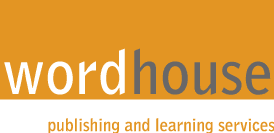Successful project management
for educational material
Everyone
involved in the 2012 Olympics held their breath right to the last
moment – and no doubt worked very hard – hoping for a successful
outcome. Such a mega-project is so prone to problems at every turn –
delay, overspend, rushed workmanship – that it sometimes seems
impossible to imagine how it’s done at all. Publishing projects are obviously never as immense, but they can sometimes seem almost as daunting or difficult to manage.
There are a hundred different
ways in which a publishing project can go adrift, wasting time and
precious budget, but just one way to get it right. The secret is to plan, review, report and monitor at every stage. That way, the project stays firmly under control at all times.
Wordhouse
has many years’ experience in managing large educational publishing
projects for clients in both the private and public sectors. We have
handled multi-volume training publications, through to small information
booklets – and everything in between, both in print and online. Here are some of the key tips we can offer.
Regardless of size, the starting point is the same. We always check assumptions. It is very easy to veer off in an unintended direction because you haven’t answered the seven most crucial questions:
-
Who is the target audience?
-
What media will be used?
-
How long is the lifespan of the product?
-
What are the desired learning outcomes?
-
What is the optimum size or extent of the finished material?
-
What is the budget?
-
Where and why might costs vary during the project?
Next comes the planning
– the race plan, if you like. At Wordhouse, we are meticulous at this
stage, setting out chapter headings, subsections, examples,
illustrations, case studies, and so on – in other words, thinking
through everything that will go into the publication, in the
right order, to the correct length or word count. And we insist that
everyone signs it off – it has saved many projects from delay or cost over-run.
Does
everyone in the team know what’s expected of them? We produce
checklists and guides for every member of the team – ours and the
client’s. The most important is the author guide, which everyone sees.
But there are always other guides too, for copy-editors, proofreaders,
subject experts and indexers to name only a few. These all help to
clarify roles and reduce misunderstandings during handovers.
Regular review meetings
with key team members are crucial, especially if they are working
remotely, as is often the case these days. It helps team spirit too, a
vital element of doing a sparkling job for clients.
...
keep clients in touch with what’s happening. At Wordhouse, we share the
reports with the whole project team, so that we are all aware of client
priorities.
…but
it saves a fortune! We are in weekly (and sometimes daily) contact with
every member of the editorial and production team. I am constantly
surprised at how many potential problems or opportunities are identified in
otherwise casual chats.
Monitoring
costs is a process dear to every client’s heart. At Wordhouse, we
believe it’s the foundation on which successful publishing projects are
built. Let the costs slip and you run the risk of it all falling apart.
Review them regularly, identify potential variances, act in good time if
necessary. This is an absolute non-negotiable part of our service and
we take it very, very seriously.





